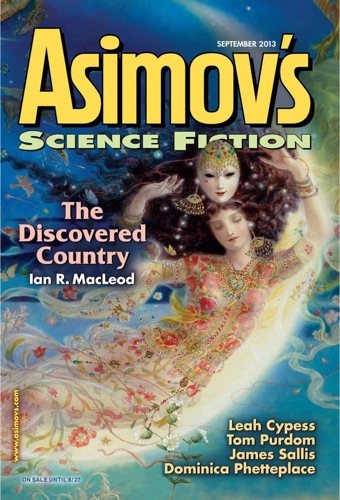Review: Asimov's Science Fiction Magazine, September 2013 [★★★★★]
Asimov's Science Fiction Magazine, September 2013
by Sheila Williams
My rating: ★★★★★
Read From: 1 February 2014 – 7 February 2014
Goal: Flotsam and Jetsam
When I've reviewed magazine issues in the past, I've always attempted to review every single story in the issue. That's a noble goal but it's also a little overwhelming and off putting. For this issue, I decided to do something different. I decided to just review the stories I liked and to ignore the rest. And, wouldn't you know it, this turned out to be the issue that I really liked almost everything.
Novelettes
The Unparallel'd Death-Defying Feats of Astoundio, Escape Artist Extraordinaire by Ian Creasey—For my next trick, I'll fall into the event horizon of a black hole and then escape back out again. And, it's obvious (of course!) when you know the trick. That's one thing. But escaping from utopia? That's another matter altogether.
A Hole in the Ether by Benjamin Crowell—Living in a world where intellectual property law has metastasized and is now the only thing that matters, a small family preserves the last free library left on earth. I don't understand why various cities and populations were getting destroyed throughout the story, but that's a minor nit about a minor point in the story. The main point, the struggle to preserve art from commercialism, was very good.
Short Stories
What We Ourselves Are Not by Leah Cypess—What if you could have cultural memories and knowledge implanted via chip? What would that do to your relationships and the whole structure of society? In this story, a seventeen year old boy faces exactly that choice as he struggles to figure out who he is, where he came from, and where he's going in a multicultural society that highly values heritage.
This is one of the best and most thought provoking stories I've read in a long time. I found myself agreeing with points on both sides of the argument (to implant or not to implant) and I still don't know which way I'd go if I had to make the decision.
As Yet Untitled by James Sallis—The central character in this story is, in fact, an actor. Not a movie actor but a book actor. Someone who appears in different books as different characters, according to the whim of the author. He faces a tough transition as he's forced to move on from his longtime genre and tackle the Western.
Non-Fiction
On Not Dying of the Light by Sheila Williams—This is a familiar feeling old school science fiction magazine editorial. Ms. Williams puts forth a call to arms: we must build a defense against incoming asteroids. It would be stupid to be able to fully comprehend what an asteroid did to the dinosaurs but still die anyway because we were too complacent to take the danger seriously. We must not die quietly of the light.
Translations by Robert Silverberg—This is an essay about it means to create science fiction. Science fiction isn't just "calling a rabbit a smeerp". Silverberg reflects on his introduction to collaborative novel Nightfall, where he made exactly that point:
The essence of this story doesn't lie in the quantity of bizarre terms we might have invented; it lies, rather, in the reaction of a group of people somewhat like ourselves, living on a world that is somewhat like ours in all but one highly significant detail, as they react to a challenging situation that is completely different from anything the people of Earth have ever had to deal with…".
Note that phrase, a world that is somewhat like ours in all but one highly significant detail. A science fiction story needs to have some underlying speculative concept, or isn't science-fiction no matter how many smeerps and greeznaks it has.
That's exactly what I look for in science fiction. (And, now that I've been reminded of it, I may have formulated my preferences based on my own reading of Nightfall, many years ago.) I love fun space stories. But what I really like is a story that can change something about our world and, in so doing, reveal things I'd never noticed before. A good SF story will move the camera a few degrees off center, giving us a totally different perspective on the familiar, revealing the commonplace to be anything but.
My Take
This is one of the best issues of Asimov's I've read yet. It makes me glad to be a subscriber and to stay one.
This entry was tagged. Book Review Review
